How video games helped me in my battle with anxiety
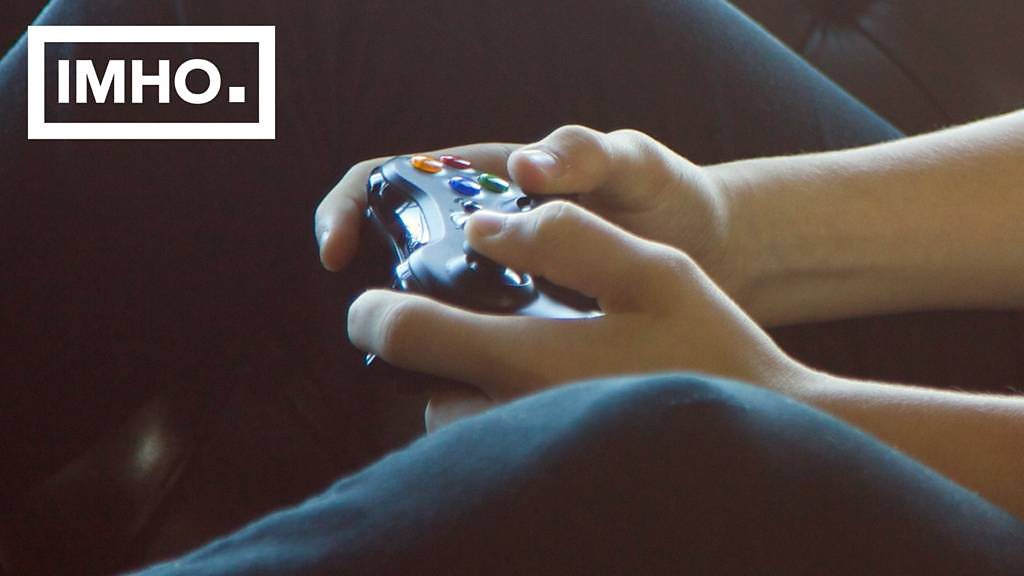
- Published
Having anxiety sometimes feels like being in a Resident Evil set piece. You’re walking down a normal corridor, happily minding your own business, when a rabid dog bursts through the window and shatters your world. Well, at least that’s how it seems to me.
My last major episode of anxiety, back in April this year, was one of the worst I can remember. Intrusive thoughts, isolation, and the irrational need to pee myself constantly, combined to create a mental assault that left me bedridden and depressed. I could barely clear my brain fog enough to get through my tube travel panic, let alone do any actual work. I found myself in a cycle of withdrawal, hopelessness, and self-doubt.
Then I picked up my console controller.
I’m an avid gamer. There’s usually nothing I love more than getting stuck in to the latest Souls game, or running around looking like a bleached blond biker in The Witcher, but that day I just couldn’t face anything.
Until I found Firewatch.
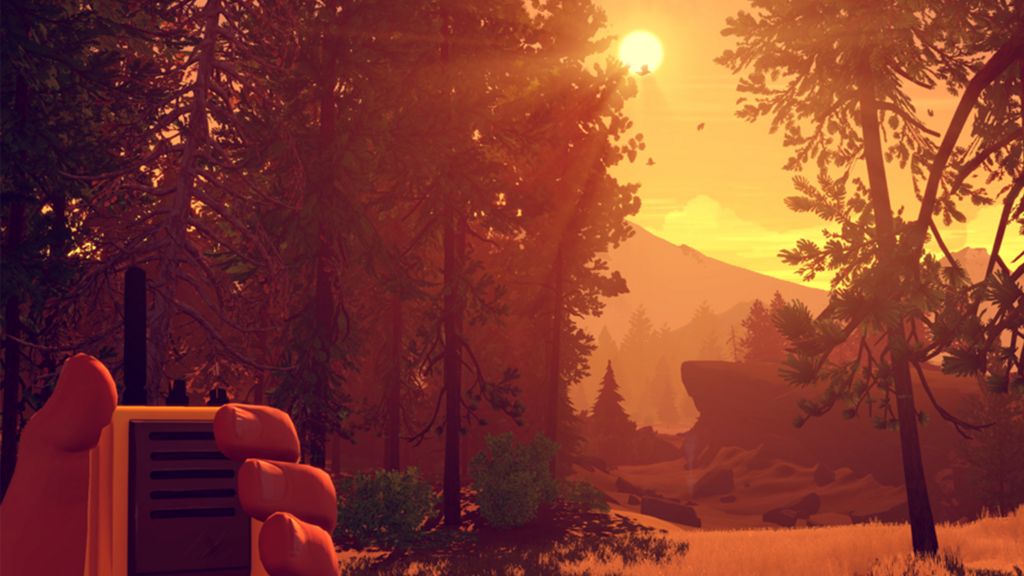
For those not aware of this little masterpiece from the San Francisco games studio Campo Santo, Firewatch is a first person walk-em-up, where you play a fire lookout called Henry in a picturesque American forest. Henry is a recovering alcoholic whose wife has early onset dementia. So far, it might not sound like a cure for mental health issues.
But it is one of the greatest mystery adventures I’ve ever played in my life. I laughed; I cried; I jumped in fear and pumped the air with jubilation.
I played Firewatch straight through, for five hours. By the end of those five hours, I‚Äôd decided to get professional help ‚Äď something I‚Äôd previously been avoiding. Then I started wondering how Firewatch had helped me where so much else had failed.
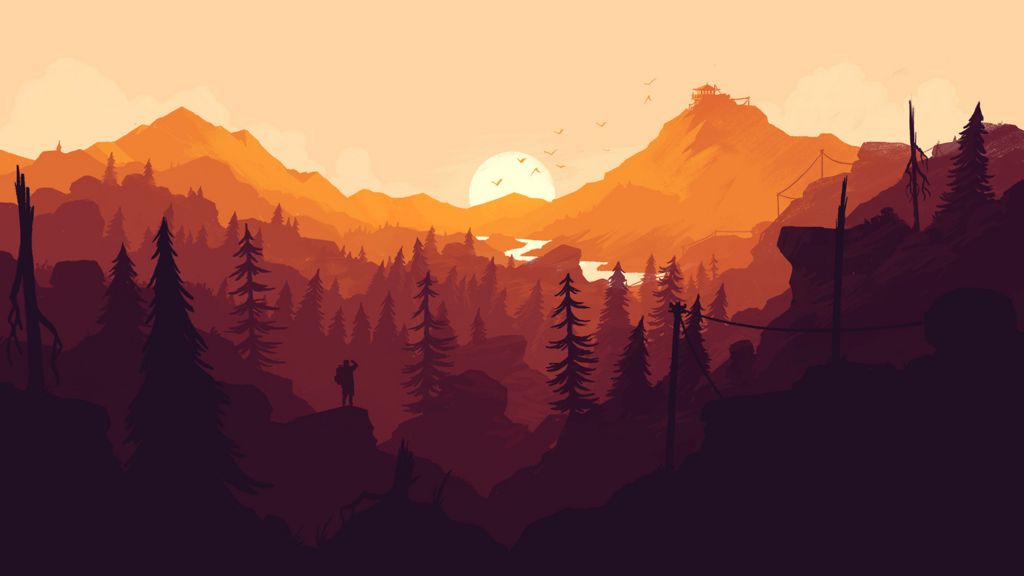
My anxiety, like a lot of people’s, revolves around control. I fear any situation that I can’t be sure won’t end up going horribly wrong.
Ironically, though, anxiety takes away your agency. It holds you captive. Anything you want to do, anxiety convinces you that you can’t: going to a party will mean you’ll embarrass yourself, seeing your friends will make them hate you, working will simply prove you’re a failure. I started being too afraid to even go out in case I couldn’t find toilet if I needed to.
Firewatch is set almost entirely outdoors. I spent hours walking in the virtual forest, soaking up the nature around me, paying attention to every detail in order to solve the puzzles I was challenged with. And I found myself forgetting about everything else. Working through the problems the game threw at me, I realised that, for the first time in a long time, I was approaching something from a positive, solvable perspective.
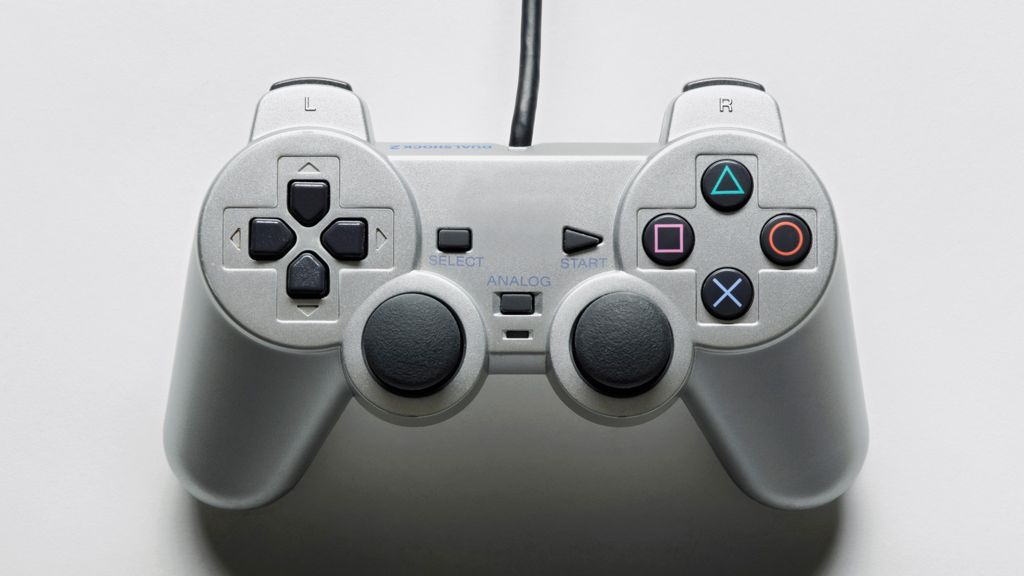
As I was to learn in therapy a week or so later, that’s the purest essence of Cognitive Behavioral Therapy. CBT, in a nutshell, is a tried and tested form of talking therapy, designed to change your thought patterns, and equip you with coping mechanisms to help you avoid, or endure, anxiety attacks.
Using video games as a form of mental health therapy isn‚Äôt actually a new idea. The game designer and author Jane McGonigal about the positive effects gaming can have on depression. Multiple studies have shown that gaming stimulates two pretty important regions of the brain: one ‚Äúassociated with motivation and goal-orientation‚ÄĚ and one ‚Äúassociated with learning and memory‚ÄĚ. Basically, the studies found that gaming worked by first setting up a challenge, a quest line to be tackled, and then rewarding you for completing them. For anyone who‚Äôs ever experienced anxiety, where every day tasks seem insurmountable and the only reward at the end of the path is another day living with your mental health issue, a fantasy world where plotlines are resolved is a pretty easy sell.
Anxiety makes you think your goals are unachievable even before you’ve set them, that projects you’re half way through are doomed to fail, and that all your past achievements are just that, in the past, never to be repeated. Your internal reward system shrinks, your motivation ebbs, and withdrawal, from society or activities you used to enjoy, may naturally seem like the best option. So gaming, with its preset quest lines and inbuilt reward system, seems like a pretty decent way to re-engage, reboot, and regain your sense of self.
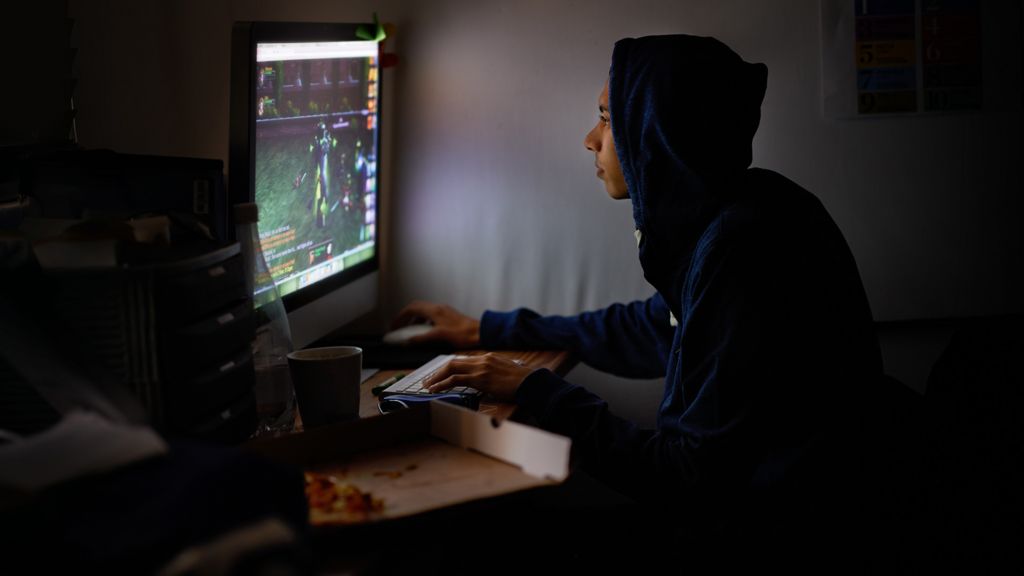
I took to Twitter to find out which games help my fellow anxiety-suffers unwind.
Bryony, a 33-year-old social media editor tells me, ‚ÄúWhen I feel anxious, I tend to turn to time management games. Like the ones where you have to serve burgers before time runs out. It should be stressful but it relaxes me cause I feel like I am doing stuff right and achieving things under pressure.‚ÄĚ
For Cal, a 24-year-old office worker and amateur comedian, it‚Äôs more about dealing with social anxiety. ‚ÄúI regularly play MMOs [Massively Multiplayer Online games]. Just being able to be part of this place that had people there but in the safety of being able to leave at any time enabled me to explore who I was and who I wanted to be around. I suppose it was therapy in a way because it was a way of me discovering and exploring my own feelings.‚ÄĚ
Personally, I liked the feeling of being in control that playing Firewatch gave me. Lindon, a 26-year-old commissioning officer, plays a different game for the same reason. ‚ÄúI‚Äôve turned to Destiny in the past,‚ÄĚ he says. ‚ÄúIt's almost meditative. There's something about the rhythmic nature of the game's cycles, the fact that I know what to expect and that I have a sense of agency over what happens.‚ÄĚ
The potential for games to help with mental health issues hasn’t gone unnoticed by developers either. In the last few years, several games that place anxiety and depression firmly in their crosshairs have cropped up, from the relaxing Flower, where you gently guide petals around the screen, to the kinetic Sym, a platform game that’s like a dark Mario Land, where the objective is to navigate the protagonist through situations that provoke social anxiety.
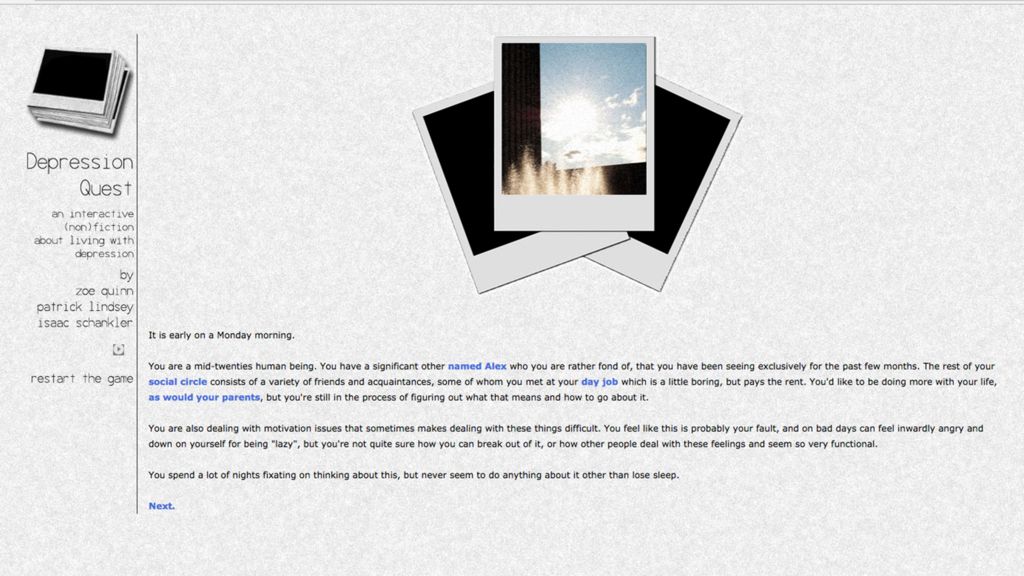
One of the most famous examples is Depression Quest, a text adventure designed by Zo√ę Quinn, a gifted writer and (sadly) the initial target of the Gamergate controversy, which puts you in the shoes of someone suffering from increasing depression. During the course of the game you‚Äôre faced with scenarios and choices, the ‚Äėeveryday‚Äô choice (e.g. actually enjoying a party without feeling like you‚Äôll never have fun again) crossed out.
The game was specifically written to offer those who might not grasp the intricate details of depression a feel for the world of those who suffer. I can imagine it’s an eye-opening experience for them. But for someone living with depression, I can’t think of anything worse than role-playing as myself.
Throughout my interviews, anxiety-sufferers said they played games for two reasons: regaining agency, and escapism. Games allow us to remove ourselves from our current situations, to set aside our seemingly insurmountable problems and turn to fantastical ones, that we are not only able to be overcome, but that give us a sense of achievement.
But does that actually help our personal lives?
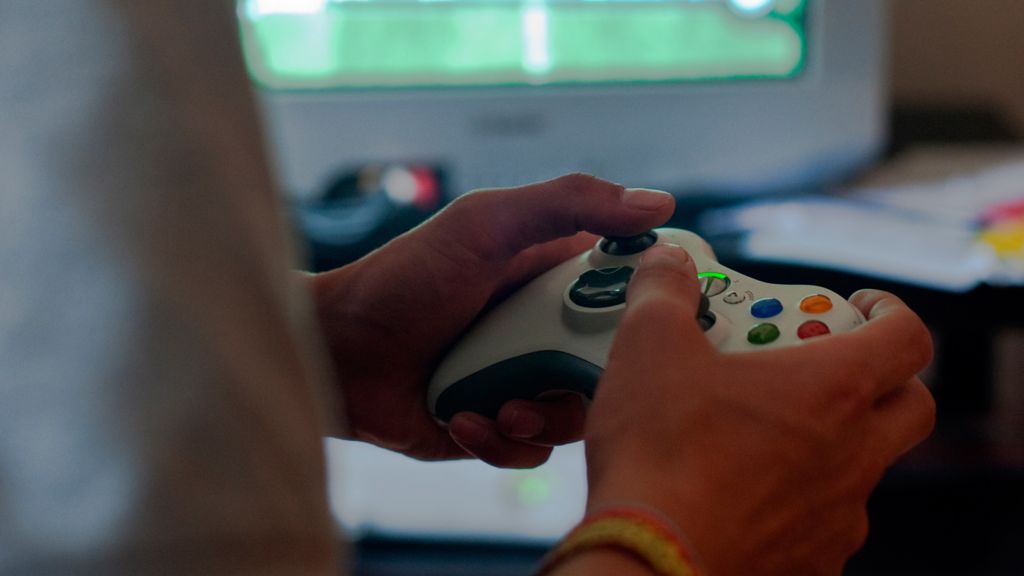
Not all those who responded to my Twitter enquiry found gaming to be the meditative experience I did…
‚ÄúI find playing them adds on to my anxiety,‚ÄĚ says 27-year-old writer Sarah. "I get hooked, and it all spirals. It can become an obsession.‚ÄĚ
Jack, a 27-year-old writer, says, ‚ÄúIt's a bit of a circle, because if I play too much and get too addicted I start to feel anxious that I'm wasting time that could be spent doing something more 'productive'.‚ÄĚ
I can’t begin to recall all the weekends I’ve spent overcome with anxiety, locked in my room playing hours of Bloodborne or Overwatch, escaping everything - the working week, the stress, the social awkwardness and the need to appear happy - only to end up feeling worse when the sun finally set on Sunday.
‚ÄúSelf-medicating with games can be a dangerous path to go down. If you play games with an 'escapist' mindset‚ÄĒthat is, to ignore your problems, to block unpleasant emotions, or to avoid confronting stressful situations‚ÄĒyou‚Äôre more likely to suffer some of the negative effects that many studies have found associated with playing games, like anxiety, depression, or social isolation,‚ÄĚ McGonigal .
My own anxiety has always become worse when I’ve given into it: when I didn’t attend that potentially career-defining meeting, or I’ve missed that night out with old friends. My withdrawal, and my unwillingness to get outside my comfort zone, caused the anxiety to stack until I was cowering beneath my bedsheets, unable to face my morning commute.
But playing Firewatch gave me the breathing space to regain my objectivity. It allowed me to see that my IRL problems were surmountable. Video games can‚Äôt fix you - for that, you‚Äôll need to level up ‚Äď but they‚Äôre not necessarily the one-way ticket to nowhere that people often assume.